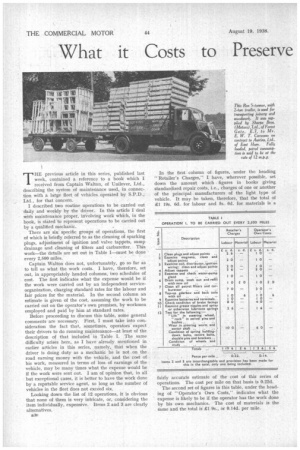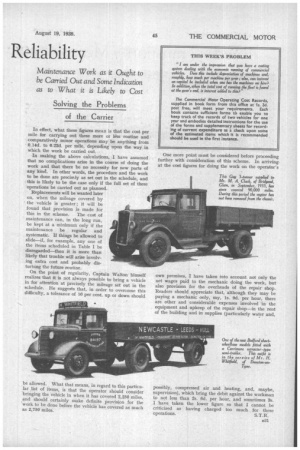What it Costs to Preserve Reliability
Page 40

Page 41

If you've noticed an error in this article please click here to report it so we can fix it.
Maintenance Work as it Ought to be Carried Out and Some Indication as to What it is Likely to Cost
Solving the Problems of the Carrier
THE previous article in this series, published last week, contained a reference to a book which I received from Captain Walton, of Unilever, Ltd., describing the system of maintenance used, in connection with a large fleet of vehicles. operated by S.P.D., Ltd., for that concern.
I described two routine operations to be carried out daily and weekly by the driver. In this article I deal with maintenance proper, involving work which, in the book, is stated to represent operations to be carried out by a qualified mechanic.
There are six specific groups of operations, the first of which is briefly referred to as the cleaning of sparking plugs, adjustment of ignition and valve tappets, sump drainage and cleaning of filters and carburetter.. This work—the details are set out in Table I—must be done every 2,500 miles.
Captain Walton does not, unfortunately, go so far as to tell us what the work costs._ I have, therefore, set out, in appropriately headed columns, two schedules of cost. The first indicates what the expense would be if the work were carried out by an independent serviceorganization, charging standard rates for the labour and fair prices for the material. In the second column an estimate is given of the cost, assuming the work to be carried out on the operator's own premises, by workmen employed and paid by him at standard rates.
Before proceeding to discuss this table, some general comments are necessary. First, I must take into consideration the fact that, sometimes, operators expect their drivers to do running maintenance—at least of the description of that included in Table I. The same difficulty arises here, as I have already mentioned in earlier articles in this series, namely, that when the driver is doing duty as a mechanic he is not on the road earning money with the vehicle, and the cost of his work, measured in terms of loss of earnings of the vehicle, may be many times what the expense would be if the work were sent out. I am of opinion that, in all but exceptional cases, it is better to have the work done by a reputable service agent, so long as the number of vehicles in the fleet does not exceed six.
Looking down the list of 12 operations, it is obvious that none of them is very intricate, or, considering the item individually, expensive. Items 2 and 3 are clearly alternatives.
In the first column of figures, under the heading "Retailer's Charges," I have, wherever possible, set• down the amount which figures in books giving standardized repair costs, i.e., charges of one or another of the principal manufacturers of the light type of vehicle. It may be taken, therefore, that the total of £1 19s. 6d, for labour and 5s. 6d. for materials is a
fairly accurate estimate of the cost of this series of operations. The cost per mile on that basis is 0.22d.
The second set of figures in this table, under the heading of "Operator's Own Costs," indicates what the expense is likely to be if the operator has the work done by his own mechanics. The cost of materials is the same and the total is 21 9s., or 0.14d. per mile.
In effect, what these figures mean is that the cost per mile for carrying out these more or 1ss routine and comparatively minor operations may be anything from 0.14d. to 0.22d. per mile, depending upon the way in which the work be carried out.
In making the above calculations, I have assumed that no complications arise in the course of doing the work and that there be no necessity for new parts of any kind. In other words, the procedure and the work to be done are precis/Ay as set out in the schedule, and • this is likely to be the case only if the full set of these operations be carried out as planned.
Replacements will be wanted later on, when the mileage covered by the vehicle is greater ; it will be found that provision is made for this in the scheme. The cost of maintenance can, in the long run, be kept at a minimum only if the maintenance be regular and systematic. If things be allowed to slide—if, for example, any one of the items scheduled in Table I be disregarded—then it is more than likely that trouble will arise involving extra cost and probably disturbing the future routine.
On the point of regularity, Captain Walton himself realizes that it is not always possible to bring a vehicle in for attention at precisely the mileage set out in the schedule. He suggests that, in order to overcome this difficulty, a tolerance of 10 per cent, up or down should be allowed. What that means, in regard to this particular list of items, is that the operator should consider bringing the vehicle in when it has covered 2,250 miles, and should certainly make definite provision for the work to be done before the vehicle has covered as much as 2,750 miles.
One more point must be considered before proceeding further with consideration of this scheme. In arriving, at the cost figures for doing the work on the operator's
own premises, I have taken into account not only the • net wages paid to the mechanic doing the work, but also provision for the overheads of the repair shop. Readers should appreciate that, although they may be paying a mechanic only, say, Is. 9d. per hour, there are other and considerable expenses involved in the equipment and upkeep of the repair shop—in the rent of the building and in supplies (particularly water and, possibly, compressed air and heating, and, maybe, supervision), which bring the debit against the workman to not less than 2s. 6d. per hour, and sometimes 3s. I have taken the lower figure so that I cannot be criticized as having charged too much for these operations. S. T.R .




















































































